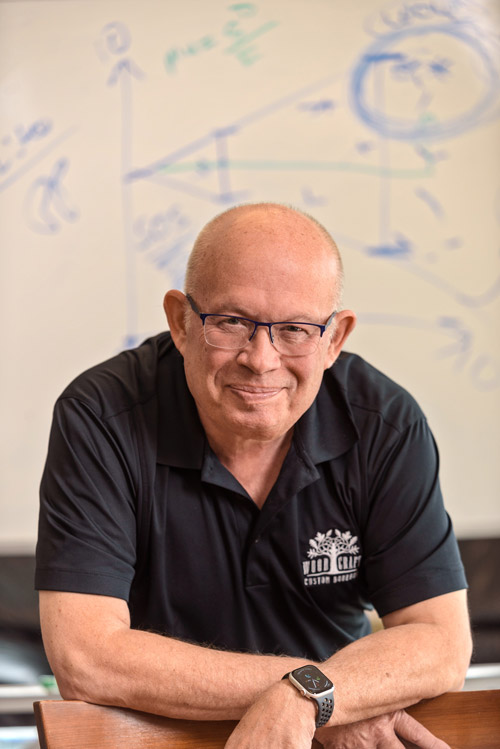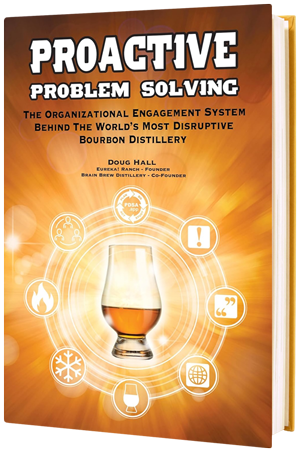DOUG HALL
Inventor • Author • Speaker • Entrepreneur • Innovation Catalyst
Doug Hall is a dynamic speaker, inventor, bestselling author, and entrepreneur who helps leaders and teams fix broken systems, eliminate chaos, and ignite a culture of PROACTIVE Problem Solving. With a career spanning corporate innovation, world-class consulting, groundbreaking entrepreneurship, and global thought leadership, Doug teaches people how to work smarter, faster, and more creatively.
More than an “ideas guy,” Doug builds things. After creating and launching a record nine products in one year at Procter & Gamble, he went on to found multiple ventures that put his innovation systems into action, including Eureka! Ranch, Brain Brew Distillery, and the Innovation Engineering Institute. These organizations reflect his belief that smart systems—not heroics—drive lasting success.
What Doug Does
Keynote Speaker
Doug delivers high-energy, content-rich keynotes and workshops that mix real-world stories, humor, and frameworks that leaders and teams can use immediately.
Innovation Trainer
Doug teaches hands-on methods for transforming teams from fire-fighting to focused problem-solvring using the principles of PROACTIVE Problem Solving and System Driven Innovation.
Bestselling Author
Doug’s latest book, PROACTIVE Problem Solving: The Organizational Engagement System Behind the World’s Most Disruptive Bourbon Distillery, offers a bold framework for identifying what’s broken and building smarter systems that actually work.
Business Builder
Doug is the founder of multiple innovative companies — Eureka! Ranch, Brain Brew Distillery, and the Innovation Engineering Institute — each proving that courageous thinking, paired with smart systems, creates real-world impact.
-
PROACTIVE Problem Solving "is quite simply a brilliant book in it’s clarity, practical application and easily digested examples. STOP STUPID – START SMART is a simple, yet powerful thought. A must read!”
Ken Grier
Founder of De-Still Creative Ltd. -
“Doug provides understanding and guidance on the vital importance of stimulating joy in work, by enabling employees to become part of the improvement of their work systems. When employees are engaged, a chain reaction of increased quality, efficiency and productivity is sparked.”
Kevin E. Cahill, President
The W. Edwards Deming Institute -
“In this tightly written volume, Doug Hall has made problem solving even easier. Read it, study it, apply it, try any or all of the techniques, and prepare to be stunningly surprised at the results!”
Barry J Bruns
Colonel, USAF (Ret) -
“For anyone who leads teams, serves on teams or wants their organization to perform at a high level, you need to read and truly digest PROACTIVE Problem Solving. Doug Hall’s strategies, tools and examples will help your business achieve more than you thought possible.”
R. Bruce Montgomery Jr.
Senior Operating Partner
Bourne Partners -
“Only Doug Hall could make PROACTIVE Problem Solving seem so effortless. Doug’s energy for changing the world, one pioneer at a time is admirable. His unwavering determination, and relentless pursuit to teach others how to make a meaningful difference redefines what is possible.”
Corrine Dupuy
Assistant Dean, College of Engineering
University of Louisiana at Lafayette
Stop the Stupid with PROACTIVE Problem Solving
In his latest book, PROACTIVE Problem Solving, Doug shares a bold and practical system to help organizations “Stop the Stupid” by eliminating inefficient work processes that drain time, energy, and resources. Drawing on decades of leadership experience and real-world success, Hall outlines a step-by-step method to identify root problems, engage teams at every level, and implement solutions that stick. With actionable tools and strategies, this book empowers organizations to reduce costly mistakes, boost employee engagement, and create lasting growth by transforming everyday frustrations into opportunities for innovation.


